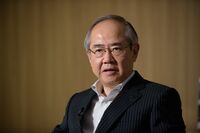發展全球市場,"致力於健康事業/產品",是日本所有食品 (例如Kikkoman Soy Sauce等等)、飲料等產業之大廠的共同趨勢。
“Everyone wants to live as long as they can.”
Kirin Holdings Co., seeking growth beyond a shrinking beer market, is turning its attention to making people healthier.
Japan’s second-largest beermaker aims to reach 100 billion yen ($910 million) in sales of food and beverages aimed at appealing to wellness concerns in the next two decades, Chief Executive Officer Yoshinori Isozaki said in an interview Wednesday. The segment could take 10 to 20 years to build out, he said.

Yoshinori Isozaki
Photographer: Akio Kon/Bloomberg
“Last year we began looking at how we can develop a business in the area of health and well-being,” Isozaki said at the brewer’s Tokyo headquarters. “Everyone wants to live as long as they can.”
Selling more food may help Kirin offset declining sales at its mainstay brewery business, where it’s also fending off intensifying competition from Asahi Group Holdings Ltd. and Suntory Holdings Ltd. Along with adding drinks and snacks that contain healthful bacteria, Kirin aims to increase its premium beer offerings in Japan and acquire stakes in brewery operations in developing markets like Southeast Asia, Isozaki said.
...Kirin has already launched the iMuse product line of snacks and drinks spiked with a lactobacilli the beermaker developed to improve digestion. Isozaki said he plans to take the business overseas soon, and wants to target Southeast Asia.
“We don’t have the concrete timing yet but we are proactively considering the opportunities there,” he said.
Isozaki said the company won’t be doing any trillion yen health-care deals, but said it’s possible to do acquisitions or joint ventures with smaller companies.
The company has a separate drug unit, Kyowa Hakko Kirin, which posted sales of 354 billion yen in 2017, the highest among divisions after Kirin Brewery. Kyowa Hakko Kirin sold out of a joint venture with Amgen Inc. last year for an expected gain of 20 billion yen. The partnership is an example Isozaki wants to follow with other tieups, he said.
Core Business
Some analysts said straying from the core alcohol business, which accounted for more than half of revenue last year, may not be the best path forward.
“Japan is an aging society and they need to think differently about the portfolio,” said Euan McLeish, an analyst at Sanford C. Bernstein. “But going into new areas where you don’t have a clear competitive advantage is a risky way of doing that.” He also said it’s unclear how big and sustainable the consumer-led opportunity is for Kirin.
Isozaki said growing the beer and beverages business has become more difficult with fewer big M&A opportunities, though he will consider a small deal in an emerging market.
“We’re most focused on Southeast Asia,” he said. “There ’s a lot of countries in the region that are just starting to develop a beer culture.”

沒有留言:
張貼留言